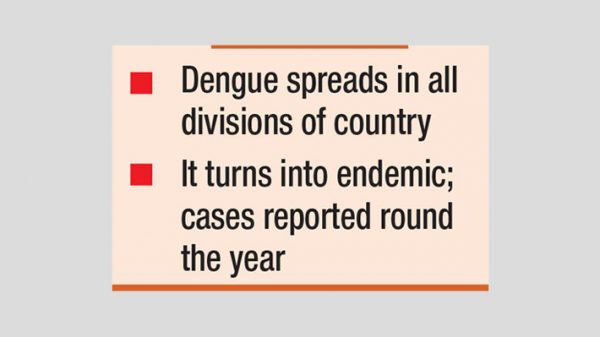Govt takes long-term plan to control dengue

Shawdesh desk:
Dengue has become another serious concern for the country’s health sector as the virus spreads in all divisions, including in Dhaka city, and is now transmitting round the year.
The government has taken a long-term plan to control the dengue disease through carrying on regular anti-mosquito drives and conducting awareness programmes in local government units, including metropolitan cities, LGRD ministry sources said.
“The dengue situation will depend on vector control. If the Aedes mosquito is destroyed, the dengue will remain under control. Otherwise, it may take a serious turn at any time, especially in the rainy season,” Prof Dr Tahmina Shirin, director of IEDCR, told the Daily Sun.
According to Directorate General of Health Services (DGHS), 525 dengue patients were admitted to hospitals and six of them died in the country in 27 days of January this year. Of them, 273 cases were reported from outside Dhaka.
The DGHS report said a total of 77,644 dengue patients, including 15,262 Forcibly Displaced Myanmar Nationals (FDMNs), were admitted to hospitals across the country, including in Dhaka, in 2022. And around 281 dengue infected patients, including 30 FDMNs, died during the same time.
Of the total infection cases, 39,220 dengue infection cases were reported in Dhaka city, 4,105 in Dhaka division except the capital, 9,109 in Chattogram, 3,350 in Khulna, 3,167 in Barishal, 1,020 in Mymensingh, 2,111 in Rajshahi, 175 in Rangpur and 125 in Sylhet.
In the previous year, 126 dengue patients were reported in January, 20 in February, 20 in March, 23 in April, 163 in May, 737 in June, 1571 in July, 3,521 in August, 9,911 in September, 21,932 in October, 19,334 in November and 4,977 in December, the DGHS report said.
Earlier, 1,405 dengue infection cases and seven deaths were reported in the country in 2020 and 28,429 infection cases and 105 deaths were reported in the country in 2021.
The DGHS report has showed that the dengue virus transmission has spread to all divisions and even in district level across the country while earlier it was called as metro disease and maximum cases were reported in the capital.
“The dengue patients are now being reported round the year while it is not limited as seasonal disease. At the same time, the dengue virus has transmitted even at district level,” Dr Md Ekramul Haque, Deputy Programme Manager of National Malaria Elimination and Aedes Transmitted Diseases Control Programme at the DGHS, told the Daily Sun.
Prof Dr Kabirul Bashar, a renowned Medical Entomologist and Scientist, said the behavioural changes of Aedes mosquito, main vector of the dengue, proves that no matter how many steps people take against it, the mosquito will survive, defeating all attempts by changing itself.
Kabirul Bashar, also the professor of zoology department at Jahangirnagar University, said usually people know that clean water is a breeding ground for Aedes mosquito that carries dengue virus.
“But in our research we found Aedes mosquito can lay eggs and complete its life cycle in sewage water, drain water and even sea salt water. We have also found evidence of Aedes breeding in even one centimetre of standing water,” he said. The entomologist further said the Aedes mosquitoes not only bite during the day, especially in the morning and afternoon, but also they bite at night.
Health experts said there is no alternative to active public participation to prevent the spread of dengue by destroying the breeding grounds of the vector of the deadly disease.
A special meeting was held at the Local Government and Rural Development (LGRD) ministry on January 5 to make a long-term plan to prevent Aedes transmitted disease. LGRD Minister Md Tajul Islam chaired the meeting.
At the meeting, the minister said dengue outbreak usually declines in October-November in the country but comparing to other years, the dengue situation is observed different this time.
“In 2022, the dengue situation was observed different, which is a matter of concern,” he said.
Mentioning that the government is working sincerely to control dengue, the minister said city corporation wards have already been divided into 10 regions to control Aedes mosquitoes intensively and step has been taken to make people aware of dengue.
“The government has taken initiatives to import more effective pesticides to control Aedes mosquitoes. Now, anyone can import approved pesticides,” he added.
The LGRD ministry sources said the government has taken long-term plan and put emphasis on integrated dengue management system to control the country’s dengue situation.
Dr Ekramul Haque of the DGHS said a 10-day post monsoon survey has started on January 26 in the capital and in around five other divisional cities to find out the existence of Aedes mosquitoes.
Some districts like Cox’s Bazaar, Pabna, Gazipur and Narayanganj also will be brought under the survey.
Sources in the Dhaka south and Dhaka north city corporations said they will conduct anti-mosquito drives and awareness programmes round the year.
“In the meeting at the LGRD ministry, some new directives have been given to control the dengue. A long-term plan has also been taken to this end,” Brigadier General Md Zobaidur Rahman, chief health officer of DNCC, told the Daily Sun.
Dr Fazle Shamsul Kabir, chief health officer (additional responsibilities) of DSCC, said they have started conducting awareness programmes and instructed the ward councillors to control Aedes mosquitoes.
Dengue usually grows in clear and stagnant water. Even a small quantity of water, as little as 40 ml, can grow mosquitoes leading to such deadly diseases.























Leave a Reply